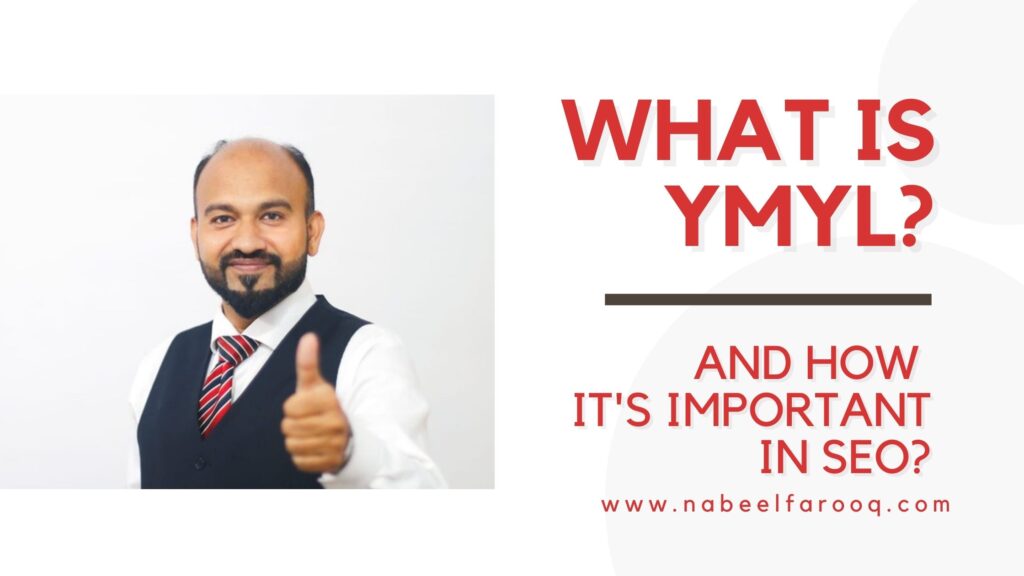
In the world of SEO, some acronyms and terms can be a little overwhelming, and YMYL is one of those. But don’t worry—understanding YMYL (Your Money or Your Life) is crucial for anyone aiming to master SEO and rank well in Google’s search results. Let’s break down what YMYL means and why it’s important for your SEO strategy.
What is YMYL?
YMYL stands for Your Money or Your Life, a concept Google introduced in its Search Quality Evaluator Guidelines. Essentially, YMYL pages are those that can potentially affect a person’s happiness, health, financial stability, or safety.
These types of pages include content that could impact significant aspects of people’s lives. So, Google applies stricter evaluation standards to them to ensure that the information is not only relevant but also safe, credible, and accurate.
In simple terms, if your website deals with topics that could influence someone’s well-being or finances, it falls under the YMYL category. This includes:
Health-related topics: Medical advice, treatments, health conditions.
Financial advice: Investments, loans, taxes, retirement planning.
Legal advice: Legal processes, personal rights, or anything related to the law.
Shopping sites and financial transactions: E-commerce websites or any page where money is involved (e.g., online banking).
Why is YMYL Important for SEO?
YMYL is critical in SEO because Google holds YMYL pages to higher standards. Why? Because inaccurate or misleading information in these areas could have serious consequences. Imagine trusting the wrong advice about a medical condition or making a poor financial decision based on unreliable content—this can negatively impact people’s lives.
Google, aiming to provide the best user experience, wants to ensure that only trustworthy sources are presenting critical information on these topics. That’s why, for YMYL pages, Experience, Expertise, Authoritativeness, and Trustworthiness (E-E-A-T) are so important. Google wants to know that the content creators have the right Experience in addition to being experts and trustworthy sources, particularly when dealing with sensitive or life-impacting topics.
How Google Evaluates YMYL Pages
When it comes to ranking YMYL pages, Google uses a set of specific guidelines that focus on:
Experience: Does the content creator have first-hand experience in the subject matter? For example, medical advice should come from professionals with practical, real-world experience.
Expertise: Does the content come from a credible expert in the field? For instance, a health article should ideally come from a healthcare professional, and financial advice should come from certified advisors.
Authoritativeness: Is the website or author recognized as an authority in the industry? Well-known medical websites like WebMD or government health sites, for example, are considered authoritative sources.
Trustworthiness: Is the site reliable and transparent? Google evaluates whether your website provides accurate, verifiable information and whether it’s safe for users to interact with it (e.g., no malicious links, SSL certificate for security).
For example, if you have a blog that provides financial advice, Google will expect your content to be created by someone with a strong background in finance—whether that’s through formal education, professional experience, or certification.
How Does YMYL Affect Your SEO Strategy?
If your website deals with YMYL topics, you need to ensure your content aligns with Google’s guidelines. Here are a few strategies to improve your YMYL SEO:
Focus on High-Quality Content: Content that is informative, well-researched, and clear is essential for YMYL pages. Always use reliable sources and avoid making unverified claims. For example, instead of giving general advice, provide specific, expert-backed information and cite reputable sources.
Improve Your E-E-A-T (Experience, Expertise, Authoritativeness, and Trustworthiness): Build a reputation as an authoritative source in your field. If you’re writing about healthcare, for instance, ensure that your content is backed by credible medical studies and written by professionals. For financial advice, the same goes: use industry experts and professional certifications to back up your content.
Update Your Content Regularly: Information changes, especially when it comes to health, finance, and legal topics. Regularly update your YMYL content to ensure it reflects the latest research and practices. Google rewards fresh, up-to-date content.
Ensure Your Site is Secure: YMYL sites, especially those dealing with transactions, need to be secure. Make sure your website has an SSL certificate (HTTPS), and your e-commerce processes are safe and trustworthy. This not only boosts your SEO but also protects your visitors.
Show Author Credentials: Make it clear who is behind your content. Display author bios that include relevant credentials, certifications, or professional experience. This is a powerful way to demonstrate expertise and authoritativeness.
Real-Life Example: YMYL in Action
Consider the website Healthline. Healthline is known for its comprehensive health articles and advice. Google ranks it highly because the site has a reputation for providing expert-driven, authoritative, and trustworthy content. Healthline’s content is reviewed by medical professionals, ensuring accuracy and authority in a field where misinformation could harm people.
On the other hand, a personal blog that offers medical advice without citing studies, including personal anecdotes without expert validation, is likely to fall short in the eyes of Google, especially when it comes to ranking high for YMYL-related queries.
Conclusion: YMYL is a Key Factor for SEO Success
If your website falls under the YMYL category, Google’s algorithms will be tougher on your content. To succeed, you must prioritize creating high-quality, well-researched content that demonstrates Experience, Expertise, Authoritativeness, and Trustworthiness (E-E-A-T). Providing accurate, trustworthy information is critical not just for your SEO, but also for the well-being and trust of your audience.
So, whether you’re creating health tips, financial advice, or even a product review page—ensure that your content is grounded in credible sources, backed by experts, and updated regularly. This will help you build trust with both your users and Google, improving your chances of ranking higher in search results.